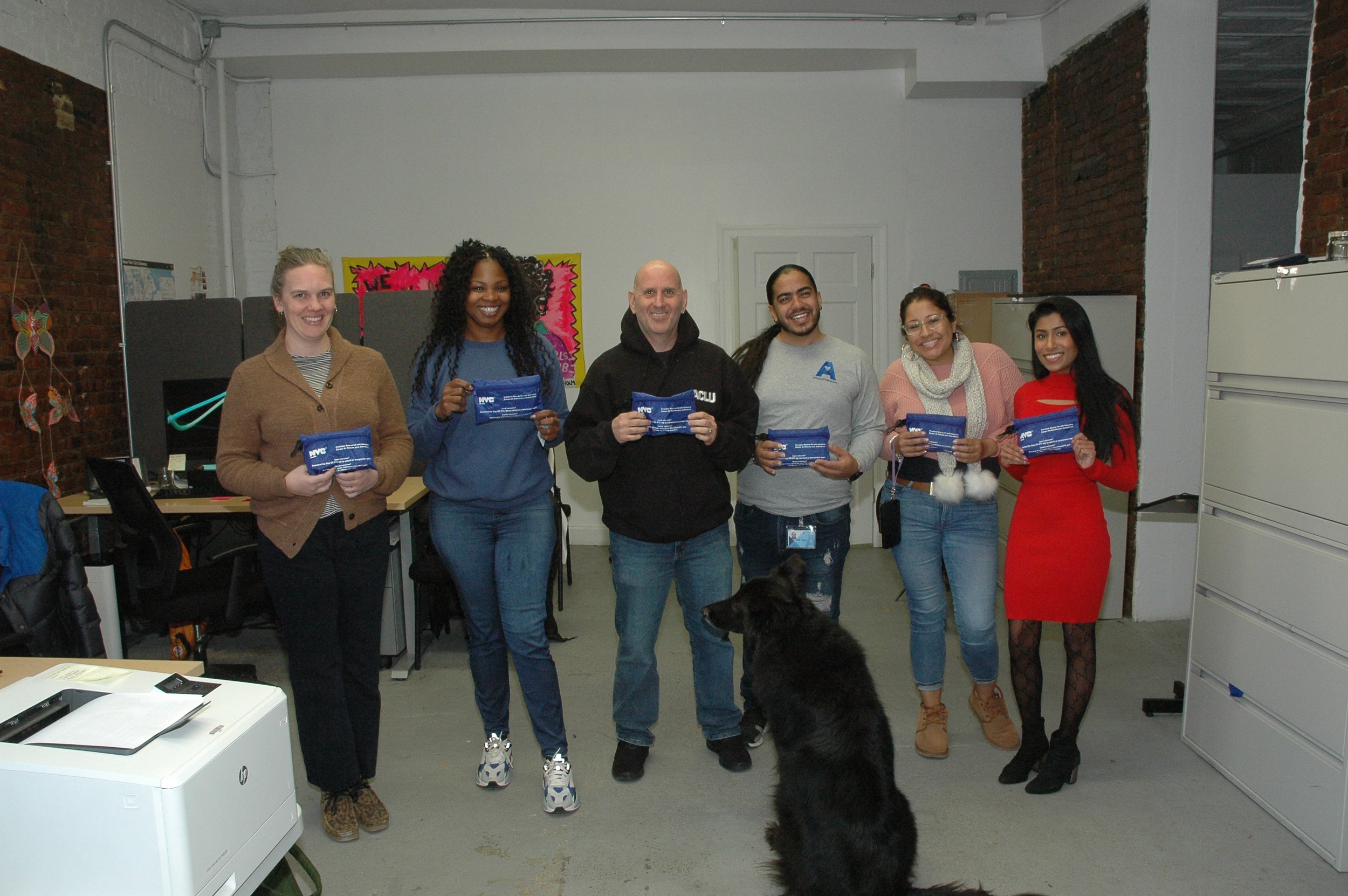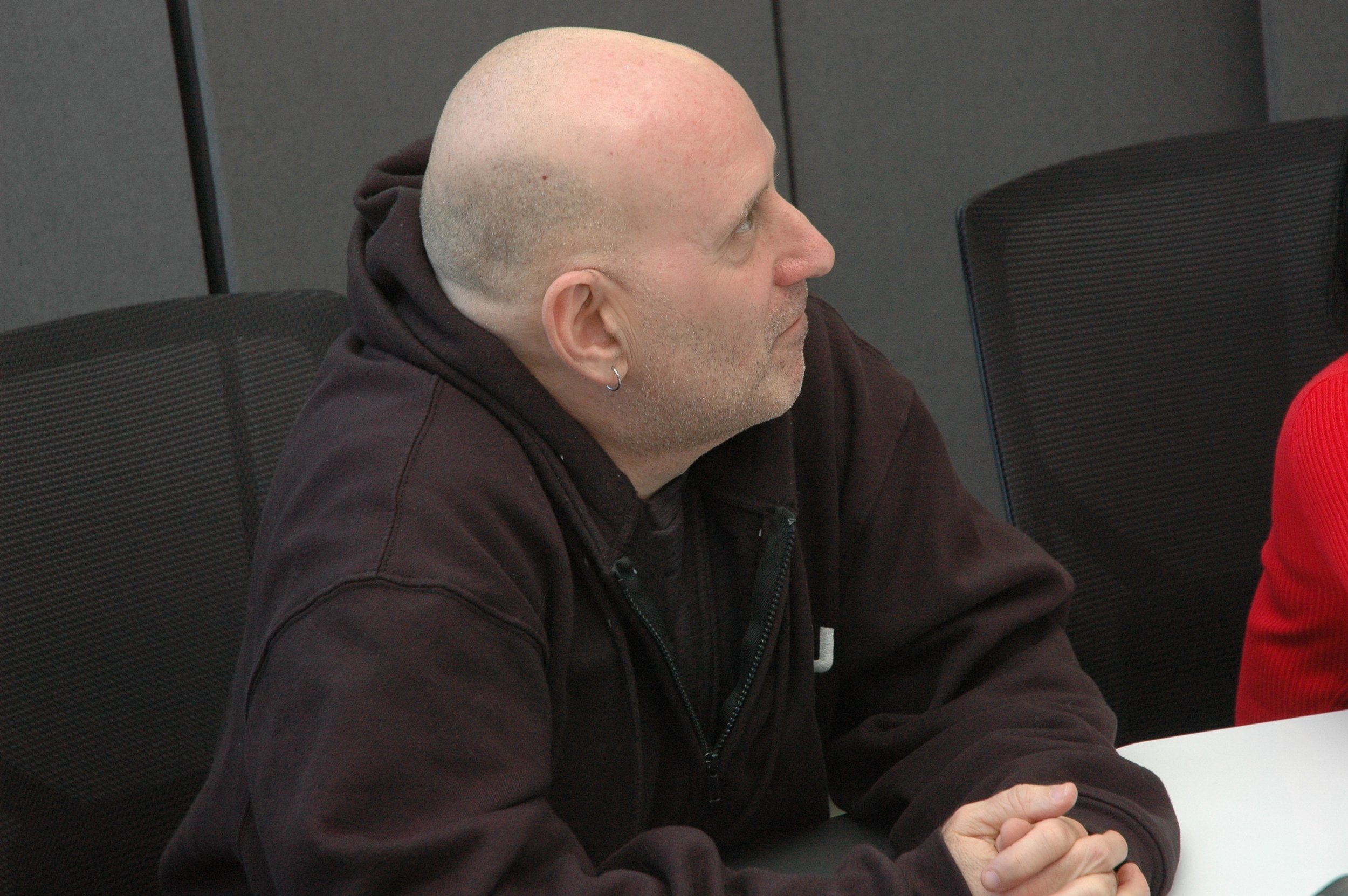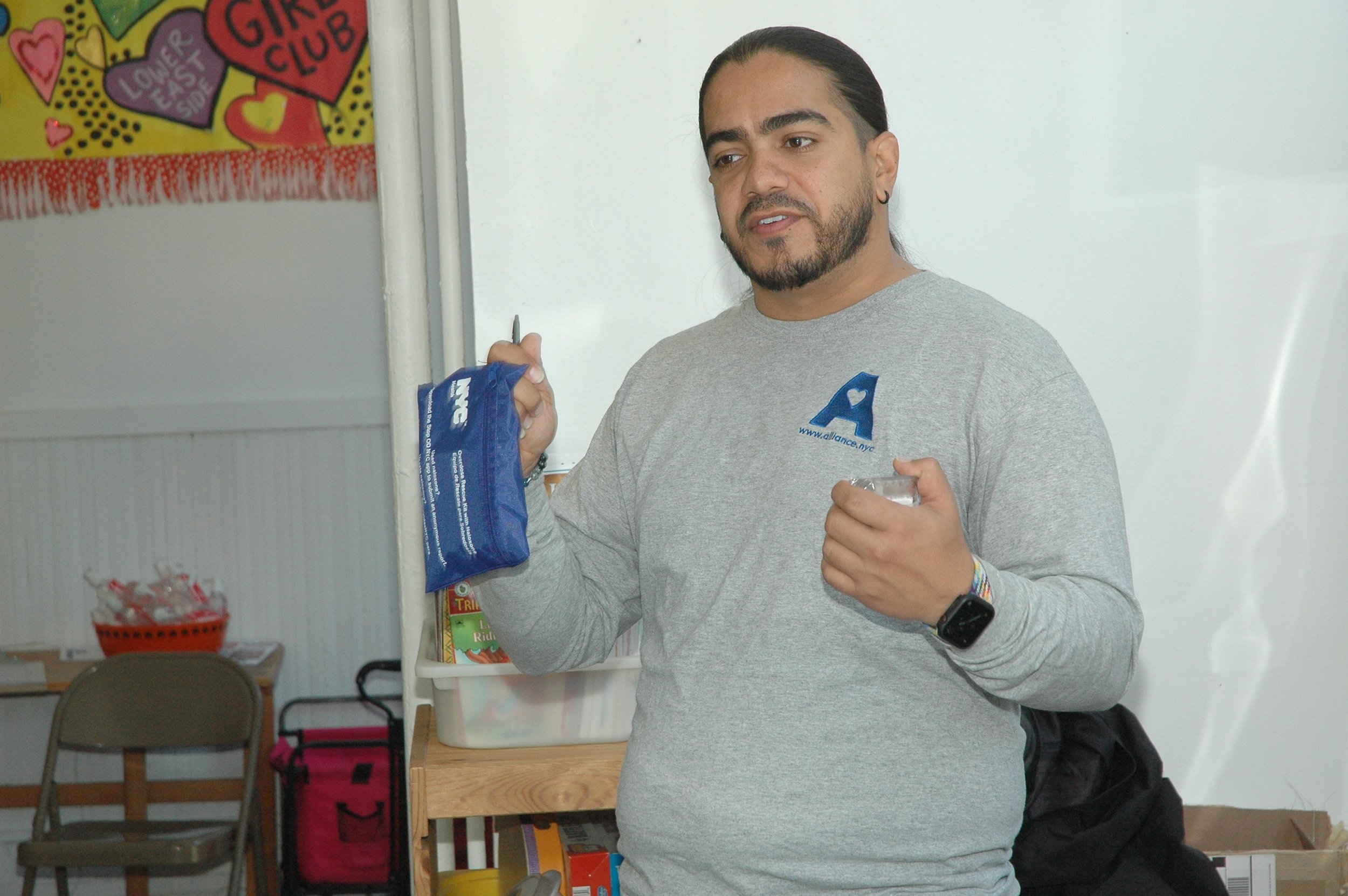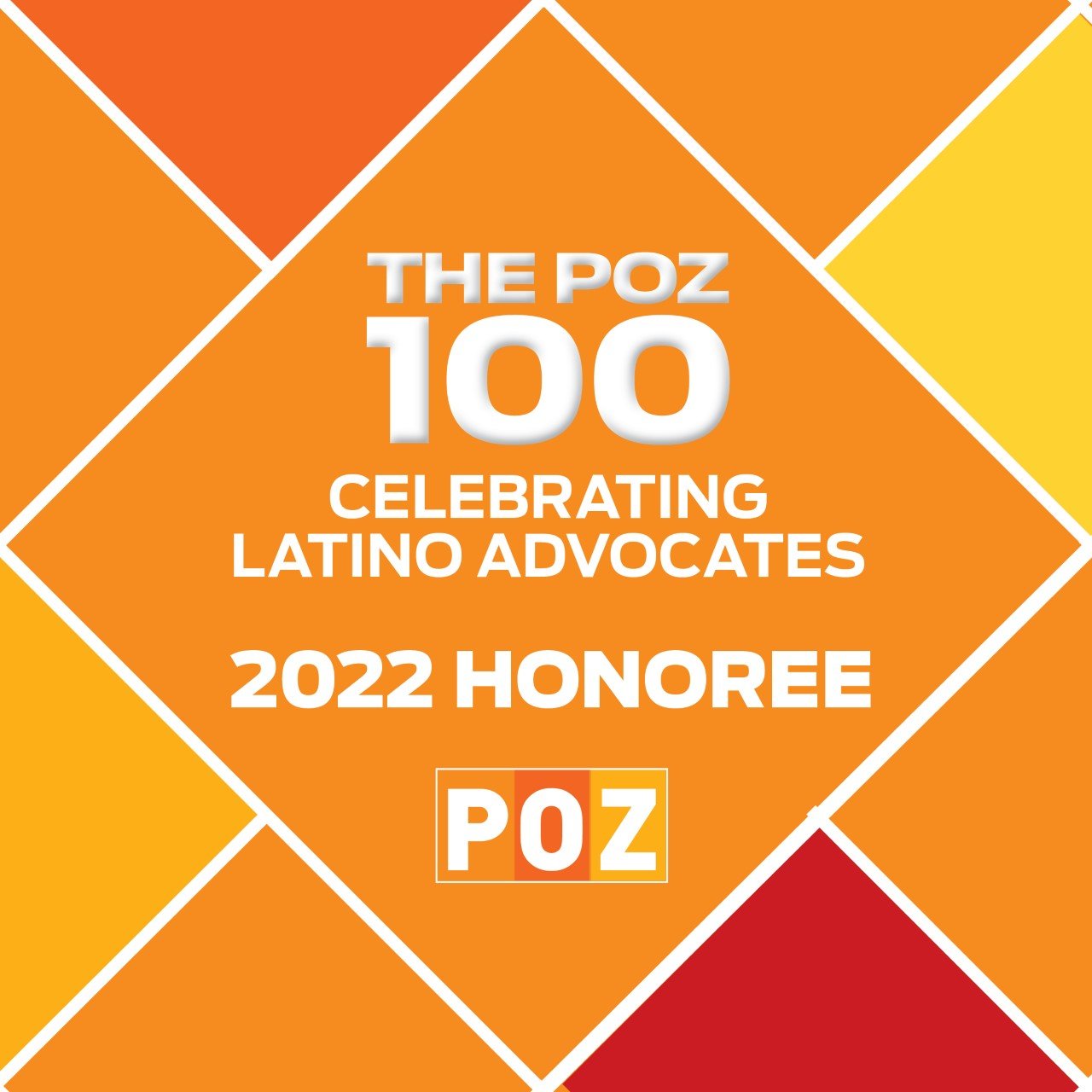On World AIDS Day 2022, Alliance’s testing event with John Jay College of Criminal Justice was highlighted in the PIX 11 morning news roundup. Watch the clip below.
Interview with Guy Williams, Recipient of Health Commissioner's Special Recognition Certificate
Guy Williams, Alliance’s Director of Prevention Services, will be awarded a Special Recognition Certificate tomorrow, World AIDS Day, from the New York State Department of Health Commissioner. He shared what this award means to him:
I'm just a Guy from Long Island
Who happens to be black
Who happens to be gay
Who happens to be HIV positive
I never thought I would get any recognition for the work I love to do.
But without the support of the Alliance for Positive Change this day would never happen for me.
Thank you, Alliance, for nominating me.
Alliance helped me manage multiple programs that reach MSM of color who are at risk for HIV infection and transmission.
My goal every day when I go to work is to equip my clients with tools so they can make positive change in the decisions they make in their life. Whether it be decisions around HIV prevention, harm reduction, or life skills. So to that end I must also thank my clients for believing and trusting this old man.
Read more about Guy’s work and values below:
1. Tell us a little about yourself: who you are, what you do, and what brought you to Alliance?
My name is Guy Williams. I am a graduate of Cycle 14 of Alliance’s Peer Recovery Education Program (PREP). I was newly diagnosed and came here to learn more about my HIV diagnosis. After graduating PREP, I took a job elsewhere but still kept in touch with people in the agency, and soon enough, a Harm Reduction Specialist position became available doing one-on-one work. I later worked as a Trainer, then an Outreach Specialist for people with HIV, and substance users. Today I’m the Director of Prevention Services.
2. So you only work with people who don’t have HIV?
Oh, no, not at all. I oversee the MSM (Men who have Sex with Men) programs at the Luis and Lillian Outreach Center (LLOC) and we work with HIV-positive and HIV-negative folks. We work with high-risk individuals, like people who share drugs and sex workers, immigrants coming here fleeing persecution, and many others.
3. Can you talk about the services your programs provide to immigrants? What exactly do you do, and why do they need you?
Many of the people new to America are proud to be gay, and felt repressed where they used to live. So it’s a transition process, being in a place where they’re not the only openly gay person they know.
We have groups like Brunch with The Brothas (meeting every third Saturday of the month) to invite people in to share their experiences in a safe environment, help them find community, figure out how they can better themselves, whether that means socially, economically, whatever.
4. Can you tell me about a specific person your program?
I’ll tell you about someone who came to the U.S. from the Caribbean. He had been sexually assaulted by a relative and was dealing with suicidal ideation—that’s not uncommon for our program participants. He’s coming to a lot of interventions, we’re trying to get him set up with permanent housing and a stable source of income.
He shares these conversations in both one-on-one settings and in large groups. We’re very tight at the LLOC.
Now, we also work with a lot of people born in America but nowhere near New York. Often, they need just as much help adjusting as people born outside the U.S. There was a couple who came to New York together from Tampa because they heard they could get HASA services. They came during a blizzard, and all they had were shorts and hoodies. The first place they came was LLOC. We took them to an emergency shelter, and got them clothing, housing. They’ve continued using Alliance’s services and are living in a safer HASA-building. One person is working and the other is currently taking Alliance educational programs to develop their skills.
5. Shifting gears: how have people’s reactions to HIV, and separately, to harm reduction work, changed in your time in the field?
I think that HIV prevention has evolved in the sense that now you can say “I have HIV” and people won’t turn white with fear, like they would for so many years. Florida has their awful “Don’t Say Gay” law. In New York, there was a “Don’t Say HIV” atmosphere for many years. Not the case today, but we have to stay mindful that NYC is not all places, and the culture is different here. Over half of our participants are not from the NYC area, and they’re adjusting to this place.
Now, how has harm reduction changed? It’s more prevalent, it’s talked about more openly now, especially over the last few years, with people knowing words like “safer use” and “Narcan,” even people who don’t use drugs.
6. How has your program changed during the pandemic?
We had to do more Zooms during the pandemic. A lot of our clients are young, and adapted to technology, but it still wasn’t the same level of intimacy.
We tried to expand our working hours and virtual game days to Sunday nights, just to build community. We also had to do a lot more case management and checking up on clients’ medication adherence. People used to show up to different offices on their own schedules, no big deal, and things like medication refills would take care of themselves, but in the early days of the pandemic everything had to be planned out. We had to do more work on the fly.
7. If you could do anything in addition to what you are doing now, what would it be?
I would be chilling in Montreal, that’s my favorite city. And I would be traveling around the world. I’d take a cruise and go around the world, seeing a different port every day.
CTR Manager Toi Pressley On 77 WABC for World AIDS Day
Toi Pressley, Counseling, Testing and Referrals (CTR) Manager, spoke with Dominic Carter on 77 WABC about Alliance's full slate of events this Thursday, December 1, 2022 (World AIDS Day.) She also discussed the decrease in testing and medication adherence that has resulted from the COVID-19 pandemic and Alliance's efforts to reach more people for testing, medication assistance, community, and more.
Alliance Issues Statement on Tragic Shooting at Club Q
Alliance for Positive Change has issued the following statement:
This year's Transgender Day of Remembrance came on the heels of a horrific shooting at Club Q, an LGBTQ night club in Colorado. This devastating act of violence shows we can not stop combating hatred and violence against the LGBTQ community. Everyone deserves to feel safe from stigma, threats, and violence. Our hearts go out to those impacted by this senseless act.
Alliance Food Giveaway and Community Health Event
On Wednesday, November 16, Alliance for Positive Change—a nonprofit that provides low-income New Yorkers living with HIV/AIDS and other chronic conditions with access to quality health care, housing, harm reduction, and workforce development services—hosted a Thanksgiving event for 200 of its program participants at its CASA Washington Heights community center.
Over 50 Alliance staff members from all five of the organization’s Manhattan sites and its Bronx supportive housing residence came together to put on the celebration in Washington Heights. The event featured a holiday food distribution, live music and dancing, HIV and HCV testing through Alliance’s mobile van, a turkey raffle, and connection to other resources.
Alliance provides food and nutrition programming year-round, serving over 30,000 ready-to-eat meals across its community centers every year, and distributing 2,500 pantry bags. Its monthly food pantry events at Alliance Midtown Central, CASA Washington Heights, LES Harm Reduction Center, and Keith Haring Harlem centers provide program participants with balanced meals and healthy pantry staples. Its nutrition counseling and workshops provide tailored food and nutrition plans for individuals with chronic conditions such as HIV, diabetes, and other immunocompromising health concerns.
Alliance is currently raising funds to expand its Food and Nutrition Services to serve more ready-to-eat meals and practical pantry items. To support its year-end fundraiser, visit https://alliance.nyc/fight-hunger.
About Alliance for Positive Change
Alliance for Positive Change is a leading multiservice organization that provides low-income New Yorkers living with HIV/AIDS and other chronic conditions with access to quality health care, housing, harm reduction, coaching, and renowned peer training and job placement programs that cultivate leadership and economic mobility. Alliance opened in 1991, at the height of the HIV crisis—a welcoming community of transformation and opportunity. Today, Alliance delivers on the promise of Positive Change with services and resources that equip people to navigate systemic inequities and achieve health and well-being. Learn about all the ways we inspire Positive Change at www.alliance.nyc
Alliance Marks Transgender Day of Remembrance
Sunday, November 20 marked Transgender Day of Remembrance. At Alliance, we recognize and remember those of the transgender community whose lives have been lost to anti-transgender violence over the years. Visit GLAAD's In Memoriam page to read the names of transgender people whose lives have been taken due to anti-transgender violence. Please make note that these crimes are often misreported, under-reported, or are not reported at all.
Alliance Provides Narcan Training to New York State Assembly Member Harvey Epstein and District Staff
(New York, N.Y.)— Alliance for Positive Change partnered with New York State Assembly Member Harvey Epstein’s office to provide an in-person training on how to identify and reverse drug overdoses by administering Naloxone. The Assembly Member and his district staff members received their Naloxone responder kits yesterday at his Avenue B office. Opioid overdose reversal medication can be used by non-medical professionals to temporarily reverse the effects of opioids, such as heroin or fentanyl, particularly in situations of overdose. The nonprofit conducts over 100 overdose prevention trainings annually for the community, corporations, local businesses, and elected officials.
The overdose crisis has become one of the most pressing issues of our time; opioid overdose is now the leading cause of accidental death in the United States, and overdose deaths reached historic highs in New York City during the ongoing COVID-19 crisis.



The NYC Department of Health & Mental Hygiene reports that in the first two quarters of 2021, there were 1,233 overdose deaths in New York City, compared to 965 overdose deaths during the same period in 2020. COVID, combined with the rising prevalence of fentanyl, led to over 100,000 Americans losing their lives to drug overdoses from May 2020 to April 2021, up almost 30% from the previous year. We must give all New Yorkers the tools to protect against overdose.
“We are proud to partner with Assembly Member Harvey Epstein’s office to promote the health and safety of New Yorkers,” says Alliance for Positive Change Chief Program Officer of Prevention Services Ramona Cummings. “New York City is facing the same overdose crisis as many regions across our country, and we thank the Assembly Member and his staff for recognizing the need to gain the skills to prevent unnecessary deaths. We must work together to end this crisis.”
“The most complex public health challenges require all of us to play a part. We know a harm reduction model is very effective when it comes to preventing overdose deaths due to opioid use and knowing how to administer Narcan is a critical tool. We’re lucky to have organizations like Alliance for Positive Change doing the important work of keeping our communities safe through education and connections to services that address the root causes of public health crises. I want to thank them for their leadership and for training our staff,” said Assemblymember Harvey Epstein.
Founded more than 30 years ago amid the height of the AIDS epidemic, Alliance is a leading multiservice organization that provides low-income New Yorkers living with HIV/AIDS and other chronic conditions with access to quality health care, housing, harm reduction, and job training. Alliance meets people where they are to access qualified healthcare, reduce risk, and explore harm reduction or recovery at their own pace. Alliance’s clinical interventions and supportive services include one-on-one counseling and coaching, education, and syringe exchange services.
About Alliance for Positive Change
Alliance for Positive Change is a leading multiservice organization that provides low-income New Yorkers living with HIV/AIDS and other chronic conditions with access to quality health care, housing, harm reduction, coaching, and renowned peer training and job placement programs that cultivate leadership and economic mobility. Alliance opened in 1991, at the height of the HIV crisis—a welcoming community of transformation and opportunity. Today, Alliance delivers on the promise of Positive Change with services and resources that equip people to navigate systemic inequities and achieve health and well-being. Learn about all the ways we inspire Positive Change at www.alliance.nyc
Ismael Ruiz Named to The 2022 POZ 100
POZ recently published its POZ 100 list Celebrating Latino Advocates, and recognized Alliance’s own Ismael Ruiz. Working at our Pharmacy Access Center and in patient navigation, Ismael is there for people in need, and we are thrilled to see his activism celebrated by POZ. Read about the other POZ honorees here, and read Ismael’s powerful Role Model story written for Alliance here.
Role Model Stories: Ismael R.
I’m a 52 year-old gay man living with HIV. I realized I was gay at the age of 5 but kept it to myself. I have one brother and one sister who I took care of while my mother went to work.
I had what you would consider a normal childhood until my mother found a letter that a guy had written me. She questioned me and I was honest because I wanted to live an authentic life. When I was 16, she asked me to leave home, and I obliged. I wound up in the streets and found myself at The Covenant House.
At the age of 17 I became a stripper at the Show Palace in Times Square to make ends meet. While I was dancing my boss hooked me up with a pimp and I started to escort. I continued that for a couple of years and at the age of 20 I met a guy at a Grace Jones concert. I still escorted and danced for 2 years before he found out, and that was when I stopped escorting.
The relationship lasted for six years until he died of AIDS. I knew I had HIV but was in denial. I didn’t bother to get tested because I didn’t want to know or have to take medication.
After my partner passed, I was left with nothing. I was severely depressed and went from house to house and eventually I tried to commit suicide. That left me at the hospital where I finally took an HIV Test and learned my truth.
After that, I started selling drugs and moved to Boston with a friend. That only lasted a year because I couldn’t be my true authentic self and lead my gay life. I finally decided it was time to pick up the pieces.
It was when then I reconciled with my mom and I can say we have a great relationship. I applied for a NYCHA apartment in the meantime. I then met my second lover and had gotten a job as a process server. We had moved in together and had a great relationship that lasted for four years, but we both knew we were better off as friends. His brother and I decided to start a home improvement business.
After that ended, I fell back into a deep depression but things quickly turned around. While I was in therapy my psychiatrist guided me in the right direction. I eventually got my apartment at NYCHA and landed an interview with Alliance for Positive Change in 2006.
My life was finally turning around for the better. I got accepted to Alliance’s Peer Recovery Education Program (PREP) and became a Peer not long after that. Alliance helped me put my life back on track and allows me to share my story of hope with my clients. Even though I have no regrets, it allowed me to learn from my experiences and made me the person I am today
Alliance COO Brenda Starks-Ross and Save New York Safety Net Coalition Fight Cuomo Carve Out
“It’s imperative to have someone help them navigate through the system to make sure that all their needs are met so they can remain healthy,” said COO Brenda Starks-Ross in NY State of Politics on Tuesday, October 25. The article features several members of organizations comprising the Save New York Safety Net Coalition. With the SNYSN, we have staged rallies every month since June and gone up to Albany to rally against “The Cuomo Carve Out” which is scheduled to go into effect Spring 2023.




